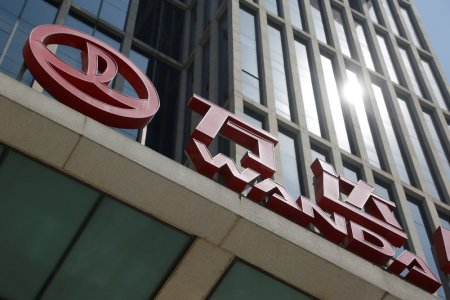 Thomson ReutersDalian Wanda Group’s Wanda Plaza building is pictured in Beijing
Thomson ReutersDalian Wanda Group’s Wanda Plaza building is pictured in Beijing
HONG KONG (Reuters) – A year after he took the reins at a key Dalian Wanda investment arm, Lu Xiaoma’s future in the halls of the Chinese property to entertainment empire will be sealed by a bold arbitrage play.
Lu is the chief architect of a $4.4 billion plan adopted by Wanda’s billionaire owner, Wang Jianlin, to take his flagship Hong Kong-listed property arm private, according to two people with knowledge of the matter. The goal is to then relist in mainland China, where developers trade at prices three times higher than their Hong Kong peers.
If shares rise once relisted in China, Lu, the little-known Chief Executive Officer of Wanda Investment Co, will have offered Wang, already China’s richest man, and the investors who agreed to fund the deal a chunky profit.
But if the delisting plan fails, the former Shenzhen bourse executive’s connections from U.S. investment banks to Chinese business leaders won’t prevent his prospects from dimming at a group that has set the tone for China Inc expansion: Dalian Wanda has spent nearly $14 billion on buying foreign and Chinese assets in the last two years alone, Thomson Reuters data showed.
“At Wanda, an executive is usually given two years to deliver results, otherwise he will be sidelined,” said a person who has worked closely with Wang, 61, whose fortune is estimated by Forbes magazine at $34 billion. “New leaders need to deliver performance; this includes internal restructuring,” he said.
The people with knowledge of the situation declined to be identified because the matter was confidential. Lu declined to comment, as did other Dalian Wanda officials.
The bid to take Dalian Wanda Commercial Properties private caught many investors by surprise – it was first announced in March, just 15 months after the firm listed in Hong Kong. Wang and Wanda managers have said they grew disappointed with the shares trading below their list price for months.
Wanda Commercial is currently worth about $29 billion by market value, but most of those shares are not publicly traded. For the stock that does float, Wanda is offering investors a 10 percent premium to Wanda Commercial’s IPO price in a buyout offer worth $4.4 billion.
To fund the buyout, Wanda set up a special vehicle, asking private investors to inject capital. In return, it is offering them a guaranteed annual premium on their investments of up to 12 percent if the company doesn’t list in mainland China within two years.
Some existing investors queried whether the terms of the offer were fair for all, and Hong Kong’s regulator took a close look at the deal before it was announced, fuelling uncertainty. DWCP shares are currently trading below Wanda’s buyout offer price, with a deadline for acceptances that could stretch as late as mid-August.
Still, some say many investors are keen on it.
“The underlying assets (of Wanda Commercial) are good and the stock in Hong Kong has not moved [compared with its listing price]…this is an arbitrage written in the stars,” said Alberto Forchielli, founder of China-focused private equity firm Mandarin Capital.
“There was a real rush to join” in the offer to invest in the buyout vehicle, he said.
FROM TSINGHUA TO STATE STREET
Wang’s growth ambitions have seen Wanda involved in $19.6 billion of capital markets transactions since 2014, including equity and debt issuance on top of the M&A transactions, Thomson Reuters data shows.
Nearly three-quarters of that has come from headline-grabbing deals by the parent group to buy assets like Hollywood movie studio Legendary Entertainment and the firm behind Ironman Triathlons.
Lu, 50, was hand-picked by Wang in an open-hiring process after nearly three years at the Shenzhen bourse. The brief – to execute domestic and overseas financial strategic acquisitions as the head of Wanda Investment Co, a unit of Dalian Wanda Financial Group that was set up last October.
“The chairman (Wang) thought that since he (Lu) was close to the stock exchange, he should let Lu be in charge of the China listing process,” said one person with knowledge of the matter. While a mainland listing was a goal first sought as long ago as 2010, Wang’s original aim was for a dual listing: the idea of delisting Wanda Commercial from Hong Kong came from Lu, that person said.
As well as Lu’s bourse background, his resume ticks boxes that would appeal to many chairmen looking for executives with connections both in China and overseas.
Lu attended the elite Tsinghua University in Beijing – the alma matter of Chinese President Xi Jinping – has an MBA from Boston College and worked for U.S. bank State Street for almost eight years, including a stint as its chief representative in China.
For Dalian Wanda watchers, Lu’s fortunes with the buyout will provide a barometer for whether the firm – now boasting an army of well-connected senior executives, both Chinese and foreign snatched from global private equity firms – can secure a burgeoning reputation for dealmaking.
“He represents a big step up in the overall level and capability of the people inside Wanda doing deals,” said one China-based investment banker who has worked with Lu.
(Reporting by Clare Jim and Elzio Barreto; Additional reporting by Lisa Jucca; Editing by Anne Marie Roanttree and Kenneth Maxwell)
Read the original article on Reuters. Copyright 2016. Follow Reuters on Twitter.
More from Reuters:
- Brazil’s impeachment trial to run into Rio Olympics
- EU telecom regulators see free Internet services as next battle
- Sarepta says FDA asks for more data for its muscle-wasting treatment
- Genentech, OSI to pay $67 million over drug claims: U.S. Justice Dept
- Saudi reform plan aims for revenue surge, salary clamp-down













